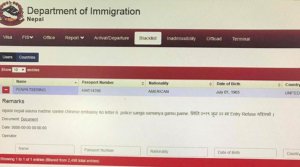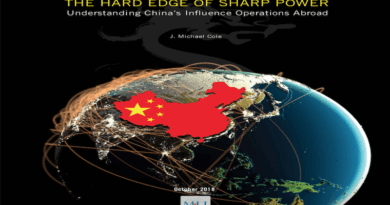Tibetan American deported from Nepal airport to appease China

DHARAMSALA, 26 June: In a clear case of discrimination and harassment, a Tibetan American was denied entry into Nepal and deported to the US at China’s behest.
Immigration authorities at the country’s sole international airport have refused to let Penpa Tsering, a Tibetan American to enter Nepal on suspicion of being an agent of the exiled Tibetan Buddhist leader the Dalai Lama, reports The Himalayan Times.
According to the report, the 53-year-old Tibetan American who arrived at Nepal’s Tribhuvan International Airport from New York City via New Delhi on Saturday was stopped by the immigration officials and later deported to the US after hours of questioning at the airport.
“He was scorned and mistreated because of his Tibetan origin. Authorities decided to deport him after questioning harshly for hours,” the report said citing an eyewitness.
Penpa Tsering requested the immigration officers to let him visit Nepal as he wanted to reunite with his friends and relatives in Kathmandu as he has flown to Nepal legally on a multiple-entry visa from India for 10 years.
But the Nepalese authorities turned down his request as in their records, a man by his name was the ‘most-wanted’ person by China, the report added.
“We acted at the request of the Chinese Embassy in Kathmandu,” the report said quoting an unnamed official from the immigration.
The Chinese, it was reported, feared that a person with the name of ‘Penpa Tsering’ could accelerate Tibetans’ movement against China in Nepal, the official has added.
The official has further disclosed that the Chinese Embassy had written to the Ministry of Foreign Affairs to restrict a person named ‘Penpa Tsering’ from entering Nepal reasoning that he is a campaigner of the free Tibet movement as well as a strong advocate of Tibet’s exiled spiritual leader.
The Tibetan American, the report said, was deported to the US via Qatar on Saturday evening by the Nepalese authorities.
Meanwhile, a mix-up in the report led to confusion within the exiled Tibetan community. The Nepalese authorities mistook the Tibetan American as Penpa Tsering, the former Tibetan Representative of North America and former Speaker of the Tibetan Parliament in exile.
Though the immigration officials doubted whether the person who arrived at the airport was the same person was wanted by China, they chose to be on the safer side by deporting him to the US and not offending Beijing by ‘honouring’ Nepal’s One-China policy.
Responding on the misreporting from Dharamsala where he has been living for the few weeks, the former Speaker of the Tibetan parliament has described it as a clear case of mistaken identity which clearly shows the extent of Chinese influence in Nepal.
The same person who shares his name underwent a similar problem in 2013 but didn’t face deportation then, the former Speaker disclosed.
Attempts to seek clarification from The Himalayan Times for its misrepresentation over using the picture of the former Speaker was met with no response while the picture has been taken off from the report in the evening.
After the Chinese occupation of Tibet in 1959, more than 20,000 Tibetan refugees have settled in Nepal. But after the 2008 Pan-Tibet protests, the Chinese Communist regime strengthened its foothold in Nepal by investing heavily on infrastructure in Nepal. Hence, the number of Tibetans crossing the treacherous Himalayan mountain passes to reach Nepal before seeking political asylum in India declined drastically.
Human Rights Watch has said in the past that, Nepal faces intense Chinese pressure to limit the flow of Tibetans crossing the border and restrictions have helped stem the number of Tibetans fleeing Tibet.
Pertaining to the condition of the Tibetan refugees in Nepal, international rights groups and activists alike have accused Beijing of using aid and investment in Nepal to ensure the government prevents any anti-Chinese activity.
“Beijing is demanding that Kathmandu strengthens its border troops,” reported DW News, a global English-language news and information channel from a German international broadcaster Deutsche Welle (DW) way back in Aug 2016 citing a confidential document from the American embassy in Nepal published by Wikileaks in 2010.
It was also revealed in the document that “China rewards Nepalese forces by providing financial incentives for handing over Tibetans who want to flee across the border.”
Nepal is not among the one hundred forty-seven nations that have signed the United Nations Convention Relating to Refugee Status, which guarantees their refugee populations certain rights. Majority of the Tibetan refugees in Nepal who were born there still remains undocumented and they often face restrictions from Nepalese authorities, particularly around significant Tibetan anniversaries.






